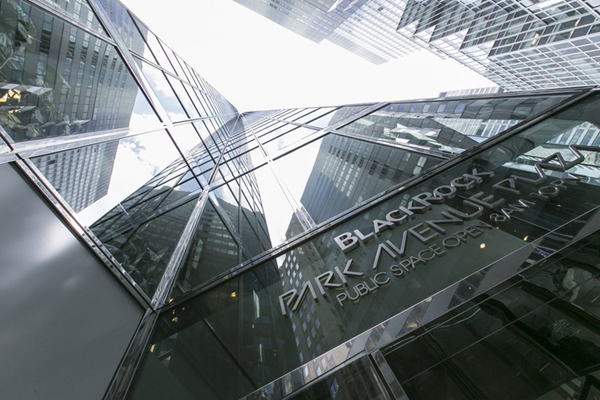|
THE
WALL STREET JOURNAL.
Markets
Meet the New Corporate Power Brokers: Passive Investors
Index-fund managers such as Vanguard often cast deciding
shareholder votes on issues such as mergers and leadership changes
|

Michelle Edkins supervises how BlackRock, the world’s biggest
money manager, votes shares held in its passive funds.
PHOTO: JESSE WINTER FOR THE WALL STREET JOURNAL |
By
Sarah Krouse,
David Benoit
and
Tom McGinty
Oct. 24, 2016 10:41 a.m. ET
Investor Jeffrey Osher and his advisers arrived at the May annual
meeting of
Green Dot Corp., a prepaid-card
company,
thinking
they had enough votes to remove its chief executive from the board.
In
the parking lot, they discovered that was no longer true. Index-fund
giant Vanguard Group, the fourth-biggest shareholder, changed its vote
over the prior weekend to support the CEO.
The
reversal is a reminder of who now has leverage over America’s
corporate boards. It increasingly belongs to investors such as
Vanguard, pioneers of passive investment funds that track indexes
instead of trying to beat the market like Wall Street’s classic stock
pickers.
Passive funds
are increasingly the default investing
option for individuals and big pension funds alike. At the
end of June, U.S.-based mutual funds and exchange-traded funds that
track indexes owned 11.6% of the S&P 500, up from 4.6% a decade ago,
according to a Wall Street Journal analysis of data from
Morningstar Inc. and S&P Global
Market Intelligence.
Vanguard’s U.S.-based passive funds owned 5% or more of only three S&P
500 companies at the end of 2005. By the end of June this year, that
number had rocketed to 468 companies, or about 94%, according to the
Journal analysis.
Passive funds used to be unequipped and unwilling to weigh in on most
corporate events. With their new power, they are waking up to how much
sway they can exercise over takeovers, the fates of chief executives
and other crucial decisions.
In June,
BlackRock Inc.,
another large passive investor,
voted against the executive pay plan at
Mylan
NV, which has since been embroiled in
controversy over its pricing of the EpiPen allergic-reaction drug.
BlackRock also cast an influential vote last year in favor of the $18
billion merger between professional-service providers
Towers
Watson
& Co. and Willis Group Holdings PLC.
Index-fund executives have added employees to deal with shareholder
votes, but say they don’t use their new power like activists
investors, who accumulate shares and make demands. They typically view
themselves as long-term holders that shouldn’t meddle in day-to-day
management.
“It’s not shareholders’ role to second guess what management is doing
in every single issue,” said Michelle Edkins, who supervises how
BlackRock, the world’s biggest money manager, votes shares held in its
passive funds.
The
change is shifting the clout in boardrooms toward investors known for
being deferential to management,
a stance troubling to stock pickers who
believe shareholders should assert themselves.
“As
more and more capital flows to index funds, the seriousness with which
these funds approach governance issues becomes even more critical for
U.S. and global corporate competitiveness,” activist
William Ackman wrote to his
hedge-fund investors earlier this year.
Daniel O’Keefe of investment firm Artisan Partners Ltd., an active
manager, contends that “the tyranny of passivity is you have large
pools of money that are unengaged in their investments,” which he
argues is “a far greater risk than the tyranny of activism.”
The last time such a concentrated group of owners had
as much control over U.S. companies as index funds do now was during
the era of
J.P. Morgan
and John D. Rockefeller, when those two businessmen had
board positions at a number of companies in which they were large
owners, researchers at the University of Amsterdam
wrote in a recent paper. They
eventually relinquished some of their power because of government and
public pressure.
In
the ensuing decades, stock ownership spread among individual
investors, leaving corporate managers largely free of powerful
stockholders with the ability to reshape their companies, the paper
said. It wasn’t until the rise of mutual funds in the 1990s that
single entities amassed large positions across so many companies.
When Vanguard started indexing in the late 1970s, founder John Bogle
gave the job of overseeing shareholder votes to one person, a staff
assistant. For years, Vanguard index funds voted some of their shares,
but didn’t devote significant resources to meeting with the management
of companies they held.
That has now changed. “We moved from a position of reluctance to make
our weight felt to absolute interest in making our weight felt,” said
Mr. Bogle, now retired from the firm.
Vanguard has 15 people overseeing work on about 13,000 companies based
around the world. BlackRock has about two dozen people who work on
governance issues at some 14,000 companies held in its index funds and
exchange-traded funds, and it plans to add seven more in the coming
months, according to a spokesman.
Boston-based
State Street
Global Advisors, another large passive-fund manager,
part of State Street Corp., has fewer than 10 employees devoted to
issues at around 9,000 companies and uses a number of automated
filters to identify companies on which to focus each year.
Mr.
Ackman, the activist investor, visited Vanguard in the summer of 2015.
It was several weeks after Vanguard, BlackRock and State Street had
backed
DuPont Co. management in a
shareholder vote, helping the chemical company defeat a campaign by
activist investor
Nelson Peltz and the firm he
co-founded, Trian Fund Management LP, to secure board seats. That vote
spurred concern among several activists that passive funds were simply
too passive.
Mr.
Ackman and Vanguard board members and executives presented different
views on what type of shareholder behavior leads to corporate change.
Mr. Ackman’s Pershing Square Capital Management LP has an investment team
of eight, plus Mr. Ackman and various other employees, for a portfolio
that normally includes about a dozen stocks.
Glenn Booraem, a principal at Vanguard who works on its governance
efforts, said in an interview that his team can’t effectively meet
with all the companies in Vanguard’s funds in one year. He said he
tries to take a longer view, communicating regularly with portfolio
companies in person, over the phone or via email.
Rakhi Kumar, head of corporate governance at State Street’s
asset-management unit, said she tells her team not to agree to every
meeting companies ask for because of time constraints. “If I don’t
have something to say to you, it’s meaningless,” she said.
Index funds say they
do watch over management. Their
executives say they have different investment time horizons and fee
structures than activists, which affects their decisions about
portfolio companies.
Before the vote at prepaid-card company Green Dot, Vanguard talked
with board members after the activist investor, Mr. Osher, argued the
company’s CEO and founder, Steven Streit, had to go, citing stock
declines and its disappointing earnings.
|

BlackRock has the world’s largest exchange-traded-fund business.
PHOTO: JESSE WINTER FOR THE WALL STREET JOURNAL |
Green Dot looked to persuade investors it was committed to change
while supporting its CEO. During the weekend before the shareholder
vote, it announced the resignation of two other board members.
That move was spurred in part by the discussions with Vanguard,
according to people familiar with the events.
Vanguard then voted for Mr. Streit, while
many active managers voted for the activist.
Index funds say they routinely talk to companies and use data and
research to make sure their approach to governance questions is best
for their investments and all shareholders over the long haul.
“We’re riding in a car we can’t get out of,” said Vanguard’s Mr.
Booraem. “Governance is the seat belt and air bag.”
A
study published in February by researchers at Boston College,
Washington University in St. Louis and University of Pennsylvania’s
Wharton School found evidence that higher ownership by passive
investors leads companies to
shed tactics seen as defensive against
shareholders, such as staggered-elected boards, and to
increase the independence of board members. It found little impact on
executive compensation or capital allocation, the kinds of operational
changes activists often seek.
How
BlackRock and the other big passive holders vote often determines the
outcome. Between 2014 and 2015, there were nearly 20 unsuccessful
shareholder proposals on environmental and social issues that would
have passed had BlackRock, Vanguard or State Street supported them,
according to a Journal analysis of data from Proxy Insight.
At
BlackRock, Ms. Edkins said she believes her team can have influence in
about 1,200 of the U.S. companies owned by its passive funds because
of the size of BlackRock’s stake or the company’s structure. She said
meetings behind closed doors can go further than votes against
management, and that BlackRock typically gives companies a year to
change before casting a dissenting vote.
BlackRock controlled 6.5% of drugmaker Mylan at the end of June,
making it the third-biggest shareholder. In meetings with the company
a few years ago, BlackRock raised concerns about executive
compensation and the company’s leadership structure, according to two
people familiar with the discussions.
Dissatisfied with changes that followed, BlackRock voted against the
company’s executive pay and the directors on the compensation
committee at the annual meeting this year, filings show. Mylan has
said its shareholders approved its executive-compensation packages. It
has since
come under fire for price increases on its
EpiPen, which in turn has drawn attention to its executive
compensation.
BlackRock’s was a sought-after vote in last year’s proposed $18
billion merger between professional-service providers Towers Watson
and Willis Group. Towers Watson investors were upset about the
proposed terms, a package of cash and shares in the combined company
worth less than Towers’s stock price when the deal was announced.
Proxy advisers Institutional Shareholder Services Inc. and Glass,
Lewis & Co. both
recommended voting against it.
BlackRock’s passive team leaned toward voting no, but portfolio
managers at the firm’s actively managed funds backed the deal, arguing
that it would create more long-term value, said people familiar with
the matter. The active managers persuaded their colleagues to do the
same.
Vanguard’s founder, Mr. Bogle, recalled unsuccessfully trying to rally
other index-fund managers in the early 2000s to form a group of
shareholders. At the time, one firm said index funds should leave the
performance of companies in their portfolios to “the invisible hand of
the marketplace,” he said.
These days, Mr. Bogle said, “we are the invisible hand of the
marketplace.”
—Coulter Jones contributed to this article.
Write to
Sarah Krouse at
sarah.krouse@wsj.com, David
Benoit at
david.benoit@wsj.com and Tom
McGinty at
tom.mcginty@wsj.com
|